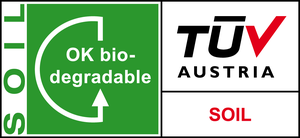NATURALpot
The plantable plant pot
Biodegradable Plant Pot
The plant pot made of our GC green materials can be planted directly with. This saves the environment as much as the plant itself.
The plant pot is metabolized by microbes in the soil. Therefore, decomposition takes place only under the influence of microbes, water and UV radiation. Thus, the decomposition process already begins in small steps at the nursery and finally ends in your garden.
technical details

Article number: 40001 || 40010
Colour: Brown || Black
Material: GC green M2571 7G3 A
Properties:
- Heigth: 82 mm
- Pot opening: 107 mm
- Fork size: 90 mm
- Pot bottom: 73 mm
- Volume: 443 cm³
- Weight: 22.3 g*
- Units on pallet: 20,380
- Biobased content: 68%
Additional information:
- Storage: -5 to 45 °C
- Shelf life: 2 years when stored in a warehouse
- Culture stability**: Up to 6 months
- Raw material from: Golden Compound GmbH
- Manufacturing: External
- Printing: Possible
* Guide values may vary slightly depending on the tool || ** depending on environmental influences, e.g. moisture, soil conditions or UV radiation

Article number: 40000 || 40002
Colour: Brown || Black
Material: GC green M2571 7G3 A
Properties:
- Height: 100 mm
- Pot opening: 120 mm
- Fork size: 103 mm
- Pot bottom: 84 mm
- Filling volume: 760 cm³
- Weight: 32.5 g*
- Units on pallet*: 9,072 || 12,600
- Biobased content: 68%
Additional information:
- Storage: -5 to 45 °C
- Shelf life: 2 years when stored in a warehouse
- Culture stability**: Up to 6 months
- Raw material from: Golden Compound GmbH
- Manufacturing: External
- Printing: Possible
* Guide values may vary slightly depending on the tool || ** depending on environmental influences, e.g. moisture, soil conditions or UV radiation

Article number: 40022 || 40024
Colour: Brown || Black
Material: GC green M2571 SF1 7G3 A
Properties:
- Heigth: 82 mm
- Pot opening: 107 mm
- Fork size: 90 mm
- Pot bottom: 73 mm
- Volume: 443 cm³
- Weight: 22.3 g*
- Units on pallet: 20,380
- Biobased content: 73%
Additional information:
- Storage: -5 to 45 °C
- Shelf life: 2 years when stored in a warehouse
- Culture stability**: Up to 1 year
- Raw material from: Golden Compound GmbH
- Manufacturing: External
- Printing: Possible
* Guide values may vary slightly depending on the tool || ** depending on environmental influences, e.g. moisture, soil conditions or UV radiation

Article number: 40023 || 40025
Colour: Brown || Black
Material: GC green M2571 SF1 7G3 A
Properties:
- Height: 100 mm
- Pot opening: 120 mm
- Fork size: 103 mm
- Pot bottom: 84 mm
- Filling volume: 760 cm³
- Weight: 32.5 g*
- Units on pallet*: 9,072 || 12,600
- Biobased content: 73%
Additional information:
- Storage: -5 to 45 °C
- Shelf life: 2 years when stored in a warehouse
- Culture stability**: Up to 1 year
- Raw material from: Golden Compound GmbH
- Manufacturing: External
- Printing: Possible
* Guide values may vary slightly depending on the tool || ** depending on environmental influences, e.g. moisture, soil conditions or UV radiation
Legal notice:
- Annex XVII of REACH Regulation 1907/2006/EC - Restrictions on the manufacture, placing on the market and use of certain dangerous substances, mixtures and articles, including Annex VXII entry 78
- Annex XIV of the REACH Regulation 1907/2006/EC - List of substances subject to authorisation
- Directive 94/62/EC (packaging and packaging waste - PPW) and associated EN13428 and CR13695 - sum of Cd, Cr(VI), Hg and Pb < 100 ppm
- Directive 2011/65/EU (Restriction of the use of certain hazardous substances in electrical and electronic equipment - RoHS) and all other RoHS legislation worldwide that restricts some or all of the following substances - Pb, Hg, Cr(VI), PBB, PBDE, DEHP, BBP, DBP, DIBP < 0.1% by weight, Cd < 0.01% by weight
- Regulation (EC) No. 1005/2009 (Ozone Layer Depleting Substances)
- Regulation (EU) 2019/1021 on persistent organic pollutants (POPs)
- No notification obligation according to Article 9(1)(i) of the Waste Framework Directive 2008/98/EC (SCIP database notification), as no substances of very high concern are present in the article.
Other sizes also available on request!
Packaging dimensions

10.5 pots
Pallet dimensions: 120 x 80 x 190 cm Pots per pallet: 20,380 pieces Gross weight: approx. 480 kg not stackable

12 pots
Pallet dimensions: 120 x 80 x 190 cm Pots per pallet: 12,600 pieces Gross weight: approx. 430 kg not stackable
NEED SOME COLOUR?
You can get the pots in 10 different colours. The colours are added during the manufacturing process and tend to be darker shades. Our NATURAL pots come in either dark brown or black, depending on the recipe. They're great for labelling different varieties!
Best Practice
* The Natural Pot is a plant pot without contents.
FAQ
The NATURALpot is 100% biodegradable and already works at various nurseries. in cultivation, i.e. processing on conventional machines is also possible.You can simply bury the pot with the plant in the soil and the micro-organisms will eat the pot. We say: Turn trash into something new!
The Plant Pot consists of an innovative material made from sunflower husks. Every year, 6 million tonnes of these remain as a waste product from the production of sunflower oil and seeds worldwide. We prefer to use this for something new! In addition to the sunflower husks, corn starch and a rock flour are used as a mineral filler.
Yes, Plant Pot it is biodegradable under natural conditions such as home compost or buried in the soil with the plant. This does not require high temperatures, as is the case with industrially compostable materials. Nature provides everything for the decomposition process of the plant pot: Moisture, oxygen and the microorganisms found in the soil.
No, according to previous experience, no additional fertilisation is necessary. However, this question will be investigated in more detail.
Different crops have different cultivation lengths. A basil grown at +18°C and intensive light irradiation requires approx. 35-40 days, the Plant Pot holds up wonderfully. Also Heather plants, such as Callunaswhich are potted in April and only go on sale at the end of September, survive outdoor cultivation in a plant pot that can be planted in the ground..
No, the Plant Pot decomposes at different rates depending on the soil conditions. On the way to complete decomposition, smaller and smaller fragments of the pot are created, which continue to degrade. Compared to microplastics, which remain unchanged in the soil for centuries, the pot particles of the plantable plant pot are soon completely degraded and no longer detectable. The microorganisms break down the material into its smallest components so that nothing remains of the pot..
How long the decomposition process takes always depends on the external conditions, because it is a natural process. Plant Pot If it is planted in February, for example, when it is still colder, it may take a little longer than if it is dug in during the warm summer.





